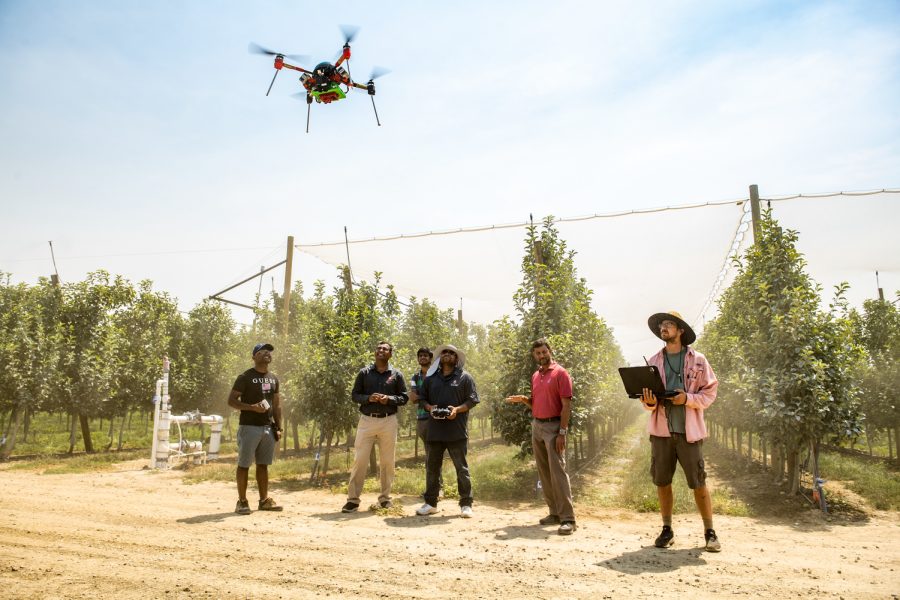Farming with bots
Robotic machines will mimic humans to improve crop quality
Anantharaman Kalyanaraman, computer science professor and lead principal investigator, and his team test an AI system at the demo research farm at a center in Prosser, Washington.
September 8, 2021
WSU received a $20 million grant in July prompting researchers to begin planning a future project that will support the development of artificial intelligence within the agricultural industry, which will take off in the next few months.
The project will take place at a demo research farm at the WSU Irrigated Agriculture Research and Extension Center in Prosser. Anantharaman Kalyanaraman, WSU computer science professor and lead principal investigator, said the research will be monitored throughout growing and harvest seasons to collect data and build AI tools.
The tools will then be tested on the farm over the next five years, Kalyanaraman said.
Project Co-director Qin Zhang said the AI tools will help address agricultural challenges, such as water efficiency in irrigation, and reduce human error with labor tasks like shoot thinning or pruning.
Farmers many challenges from year to year and may not remember solutions from past seasons, Zhang said. The idea of using AI is to store these solutions to act as tools when needed.
“By tradition, farmers never use data,” Zhang said. “They use experiences, knowledge and wisdom.”
For example, fruit thinning is a manual labor task done yearly in vineyards, he said. With the use of AI, a robotic machine will know which shoots need to be removed without manual help.
Humans may become tired after a 10-hour workday, Zhang said, so implementing AI will reduce human error and store information to mimic humans. This will help farmers avoid mistakes and improve the overall quality of crops.
“Eventually, the computer will do as good of a job as humans, or in the future, even better than a human,” he said.
AI will help provide a more accurate way to back knowledge and technology to assist with agricultural production and long-term decision making, Zhang said.
If a farmer is facing a cold night and is concerned about their crops, they may decide to turn off the irrigation or turn on heating to mitigate loss, Kalyanaraman said. AI tools will have data that can help with these decisions to improve crop quality and yield.
The research project will have over 50 collaborators from different fields. Computer scientists will develop the AI technology and field researchers will identify issues firsthand, Zhang said. The demo farm will also be an education center for farmers to learn how to use AI tools.
Kalyanaraman said it will be important for farmers to be educated on the use of AI in agricultural practices, but the implementation of AI is not designed to eradicate humans in the workforce.
“Crop management is a significantly complex exercise, which needs to be driven by the human,” he said. “We are trying to create more productive partnerships between the human and the AI system.”
Zhang said researchers will need to prove that AI can be used to advance agricultural practices within the next five years.
“Agriculture is just like any other industry — we are applying more and more digital technologies for improving the efficiency and profitability,” Zhang said.
The use of AI is not limited to agricultural purposes, Kalyanaraman said. Ideally, AI will be used long-term to contribute to issues surrounding global health, water allocation and climate change.
“This institute gives us a framework where we can really lay down some of the AI foundations that can be broadly used to multiple domains,” he said.









